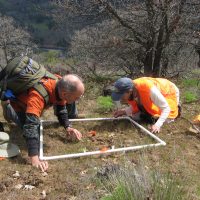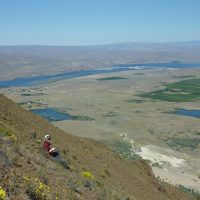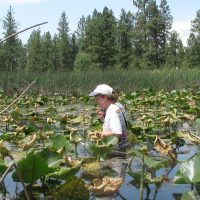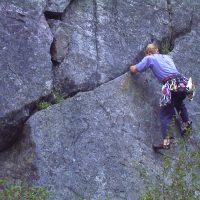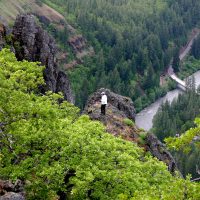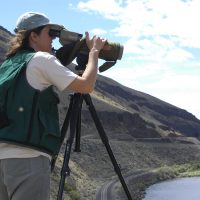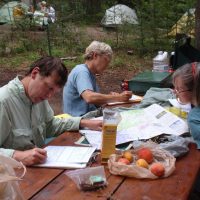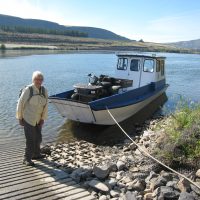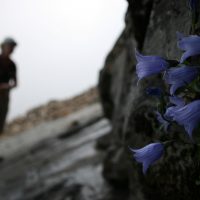Volunteers are the core of the rare plant monitoring program – a multi-decade effort to visit known populations of rare plants around the state. Rare plant monitors visit some of the most beautiful ecosystems in Washington State to collect data on rare plant populations.

Rare Plant Monitor
 Summary of Position: The Washington Rare Plant Care and Conservation Program (Rare Care) partners with the Washington Natural Heritage Program to update inventories on rare plant populations around the state. Rare plant monitors assist by visiting known populations of rare plants and collecting data on the population and reporting on any threats observed during the site visit. In many cases, these populations have not been visited in a decade or more, so the information gathered by rare plant monitors is vital for protecting the rich botanical biodiversity of Washington State.
Summary of Position: The Washington Rare Plant Care and Conservation Program (Rare Care) partners with the Washington Natural Heritage Program to update inventories on rare plant populations around the state. Rare plant monitors assist by visiting known populations of rare plants and collecting data on the population and reporting on any threats observed during the site visit. In many cases, these populations have not been visited in a decade or more, so the information gathered by rare plant monitors is vital for protecting the rich botanical biodiversity of Washington State.
Benefits: Observe wild populations of some of the rarest plants in Washington and learn about the ecosystems they rely on. Deepen your commitment to conservation of biodiversity and at the same time visit some of the state’s premier native ecosystems.
Essential Responsibilities:
- Attend a required 1-day orientation and training session in the spring.
- Survey, document and report on rare plant population at one or more sites selected by the volunteer from a list of monitoring priorities maintained by Rare Care.
- Conduct preparatory research to determine how to access the site of the rare plant population, when the best time is to monitor the population, and the key diagnostic features of the target species.
- Conduct the site visit to the rare plant population and arrange for your own transportation to the site.
- Submit a completed field data sheet for each monitoring assignment within a month after the site visit is completed. Submit quarterly time sheets.
- Complete at least one monitoring assignment annually. One assignment may require multiple site visits.
Qualifications:
- A commitment to plant conservation and stewardship.
- Ability to identify native plants in the wild and to distinguish rare plants from other co-occurring species. Additional, formal training in plant identification is a plus, but not required.
- Ability to work independently with little supervision in the outdoors in varying weather conditions.
- Ability to hike 1 to 5 miles over uneven terrain and possibly off-trails.
- Your own transportation.
- Computer access, and an email address.
- Good observation skills and an attention to detail.
- Ability to collect scientific data and organize it for efficient reporting to Rare Care and our partnering agencies.
- Good navigation skills are a plus, and additional training is available through Rare Care.
- A willingness to follow and abide by some basic ground rules intended to protect rare plant populations and foster good communication with our agency partners.
- Reliability, commitment and promptness in filing reports.
Expectations:
- Represent Rare Care and conduct work in a professional manner.
- Keep all information on the exact location of rare plant populations confidential.
- Minimize your impacts to rare plant populations by removing seeds and plant materials from your clothing and shoes prior to every site visit.
Time Commitment:
- Attendance at an all-day training session (now held virtually).
- Complete at least two monitoring assignments over two years. Each assignment may require two site visits.
Sound like a good fit? Please read the Program Introduction.
Rare Plant Seed Collector
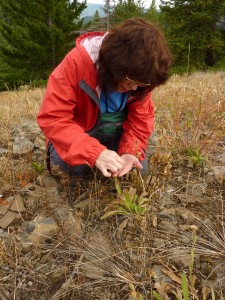 Trained volunteers contribute to the seed bank by collecting seeds from wild populations of rare native plants. To become a rare plant seed collector, you must be participating in the rare plant monitoring program and attend an additional one-day rare seed collecting training.
Trained volunteers contribute to the seed bank by collecting seeds from wild populations of rare native plants. To become a rare plant seed collector, you must be participating in the rare plant monitoring program and attend an additional one-day rare seed collecting training.
Summary of Position: Rare Care constructed the Miller Seed Vault in 2003 to store seeds from rare native plants and plants of horticultural significance under optimal environmental conditions for future use in conservation and research. Ex-situ conservation of seeds safeguards against the possible loss of a rare plant species or individual population by banking the genetic resources of individual populations for future use in reintroductions. Seed collectors are responsible for conducting all site visits to establish seed availability and ripeness, collecting seeds, and delivering seeds and seed collecting report to Rare Care.
Benefits: Observe wild populations of some of the rarest plants in Washington and learn about the ecosystems they rely on. Deepen your commitment to conservation of biodiversity and at the same time visit some of the state’s premier native ecosystems. Learn about collecting seeds from wild plants and develop an understanding of seed ecology.
Essential Responsibilities:
- Attend a required 1-day training session on seed collecting in the spring.
- Survey, document, collect seeds from a rare plant population selected from a list of seed collecting priorities maintained by Rare Care.
- Conduct preparatory research on accessing the site of the rare plant population, on key diagnostic features of the target species, and on determining what the ripe seeds looks like.
- Arrange for your own transportation for the site visit.
- Ship or deliver seeds to Rare Care as soon as possible after they are collected in order to preserve the integrity of the seeds.
- Submit a completed seed collection form for each assignment within a month after the site visit is completed.
- Complete at least one seed collection at least every two years. One assignment requires two or more site visits to establish seed maturation rates and to be at the site when the seeds are mature.
Qualifications:
- A commitment to plant conservation and stewardship.
- Completion of the rare plant monitoring training and at least one monitoring assignment is a prerequisite for being a seed collector.
- Ability to identify native plants in the wild and to distinguish rare plants from other co-occurring species. Additional, formal training in plant identification is a plus, but not required.
- Ability to work independently with little supervision in the outdoors in varying weather conditions.
- Ability to hike 1 to 5 miles over uneven terrain and possibly off trail.
- Your own transportation.
- Good observation skills and an attention to detail.
- Good navigation skills are a plus, and additional training is available through Rare Care.
- A willingness to follow and abide by some basic ground rules intended to protect rare plant populations and foster good communication with our agency partners.
- Reliability, commitment and promptness in filing reports.
Expectations:
- Represent Rare Care and conduct work in a professional manner.
- Exercise good judgment in the field when deciding whether there is adequate seed production to support a collection. Guidelines will be presented at the 1-day training.
- Keep all information on the exact location of rare plant populations confidential.
- No plant material will be collected for personal use.
- Minimize your impacts to rare plant populations by removing seeds and plant materials from your clothing and shoes prior to every site visit.
Time Commitment:
- Attendance at an all-day training session.
- Complete at least one seed collection over a two year period.
Current monitoring volunteers should let Program Manager Wendy Gibble know of your interest in becoming a rare seed collector.
How to Apply
 Apply for a volunteer position with Rare Care by filling out an online volunteer application. Visit the UW Botanic Gardens “Volunteer” web page and select “Rare Care Rare Plant Monitor.” The monitoring volunteer position opens for applications each year in December and training occurs early the following year. Training space is limited and volunteers will be accepted based on their appropriate skills and experiences, as listed above. We want to set everyone up for success!
Apply for a volunteer position with Rare Care by filling out an online volunteer application. Visit the UW Botanic Gardens “Volunteer” web page and select “Rare Care Rare Plant Monitor.” The monitoring volunteer position opens for applications each year in December and training occurs early the following year. Training space is limited and volunteers will be accepted based on their appropriate skills and experiences, as listed above. We want to set everyone up for success!
Missed the annual monitoring training and can’t wait to get started? Consider jumping in as a seed vault volunteer.
If you have questions, feel free to call the Rare Care office at (206) 616-0780 or email us.
Training & Events for Rare Plant Monitors & Seed Collectors
Rare Care offers Rare Plant Monitoring Training and Seed Collecting Training most springs, as well as occasional other opportunities (such as group monitoring trips) that strengthen volunteers’ skills.
All newly accepted Rare Plant Monitor volunteers across the state are expected to attend the virtual training on Saturday, February 28, 2026. They also should plan to devote several hours the week before the training for supplemental training videos at their own speed. An optional, in-person training to practice data collection skills will be scheduled based on volunteers’ locations. Volunteers near and far, and returning or just starting are welcome to both of these events. RSVP required to rarecare@uw.edu.
Click on thumbnails for a glimpse of where rare plant monitoring and seed collecting may take you!

